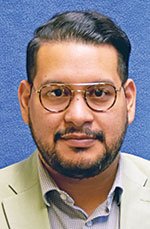Hispanic Ministry / Felix Navarrete
Eucharistic Revival is a chance to rekindle our hearts about Jesus
(En Espanol)
 Although for many, including some Catholics, the Eucharist is a symbol, for many others, it is the only way to achieve the grace of feeling united to the Church, to its trinitarian mystery and, of course, to the very heart of Jesus.
Although for many, including some Catholics, the Eucharist is a symbol, for many others, it is the only way to achieve the grace of feeling united to the Church, to its trinitarian mystery and, of course, to the very heart of Jesus.
Today more than ever, many yearn to find the true happiness of the Eucharist, the source and summit of our faith, which those who have preceded us talk about so much.
It is not by chance that reputable saints, priests, religious and laity have found the key to being happy in something so simple—but inexplicably valuable—and that is finding happiness in a relationship with what to some is simply a piece of bread. It sounds crazy to skeptics. How can you love someone or something without knowing it? How is the real presence of Jesus in the Eucharist reduced to a simple matter?
We humans, by nature, use our external senses to communicate, express and develop beliefs throughout our lives. Therefore, we expect the same from other people. We only have perceptions of strangers until we meet them, and after getting to know them, we can love them since one cannot love without knowing.
In our relationship with the trinitarian mystery, we love God without really knowing him, and after we get to know him, we begin to understand. This leads us in a way of thinking and believing that many don’t understand.
A lack of meaning in things causes rationalists to fall into a chaos of not understanding, leading to skepticism and falling into a position similar to that of
St. Thomas the Apostle, who said of the risen Lord, “Unless I see the mark of the nails in his hands and put my finger into the nail marks and put my hand into his side, I will not believe” (Jn 20:25).
God does not wait for our darkest moments, where we do not find meaning in our lives and have a disarray of ideas; he comes to us through his Holy Spirit to bring order and peace and to revive our faith, taking advantage of our human rationality.
He asks us if true happiness is achieved by following logic in things and in our feelings, and if it actually makes sense to live by only perceiving what is within the reach of our senses.
In his book Confessions, St. Augustine of Hippo experienced this firsthand, writing, “Late have I loved you, beauty so old and so new, late have I loved you! Behold, you were inside me and I was outside, and I was looking for you on the outside; and deformed as it was, I threw myself on these beautiful things that you created.
“You were with me, but I was not with you. Those things that, if they were not in you, would not be, kept me away from you. You called and cried out, and broke my deafness; you shone and shone, and escaped my blindness; you exhaled your perfume, and I breathed it in, and I sigh for you; I liked you, and I feel hunger and thirst, you touched me, and your peace burned me” (#38).
Understanding the great eucharistic mystery is reserved for those who, without knowing Christ physically, love him in the appearance of bread and wine. And through the consecrated hands of a priest, the bread and wine truly becomes the body and blood of Jesus.
Many have lost the desire to know of the love of the real presence that, instead of us consuming him, it is he who consumes us, thus becoming the most sublime act of union in a mechanism where a receiver opens his lips to receive a “this” instead of a “who.”
In the context of the ongoing National Eucharistic Revival, in which the archdiocese is hosting a Eucharistic Congress in July of 2024 in Indianapolis, Jesus is calling us to be witnesses of his presence as the center and only means of salvation for our Church and its faithful.
The revival is nothing more than rekindling our hearts through the fire of truth, and who is the truth?
“I am the way, the truth and the life” (Jn 14:6) are the words of Jesus. Therefore, let us be kindled with love for him, look at him, follow him, trust him, know that he is in every tabernacle, and that he continues to be the reason why our Church exists and prevails through the ages.
And let us remember that through that truth we will be freed from sin and the influence of a world that does not recognize that in true humility lies true power.
(Felix Navarrete is archdiocesan coordinator of Hispanic Ministry.) †
 Although for many, including some Catholics, the Eucharist is a symbol, for many others, it is the only way to achieve the grace of feeling united to the Church, to its trinitarian mystery and, of course, to the very heart of Jesus.
Although for many, including some Catholics, the Eucharist is a symbol, for many others, it is the only way to achieve the grace of feeling united to the Church, to its trinitarian mystery and, of course, to the very heart of Jesus.